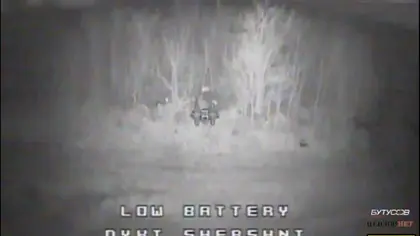A Ukrainian group of strike drone operators shared a video on Facebook that showcased the operation of Ukrainian-engineered, night vision equipped, first person view (FPV) drones, targeting a Russian tank and positions.
The charitable foundation Wild Hornets, which is involved in the production of FPV drones for the Armed Forces of Ukraine (AFU), has developed a cost-effective solution for nighttime operations for its FPV drones.
JOIN US ON TELEGRAM
Follow our coverage of the war on the @Kyivpost_official.
The caption to a video it has posted on social media said, “If a standard thermal imaging camera for an FPV costs $1,000, then this technical solution is only $50.”
The NGO has kept the exact technical details of their night vision capability close to their chests for obvious security reasons and to prevent Russian forces from adopting a similar method or devising ways to counter the drones.
A Ukrainian aerial intelligence scout, speaking anonymously to Kyiv Post, highlighted the effectiveness of strike drones during nighttime attacks, citing the element of surprise against vulnerable forces.
“The released video demonstrates how these modified UAVs reveal themselves at night with a light, prompting Russian soldiers to attempt shooting them down with small arms,” the scout told Kyiv Post.
“However, hitting such small and fast targets is extremely challenging, making this innovative method both cost-effective and more efficient than many conventional drones,” he added.

Drone Strikes Shake Russia Overnight, Reportedly Spill Acetone in Leningrad Region
The footage from the drone's camera revealed instances of interference, likely stemming from Russian attempts at electronic warfare.
Discussing the video further, the source said that it showed the targeting of a Russian tank, military truck, camouflaged Russian troop positions, and soldiers taking cover within a building.
Kyiv Post analysts were unable to independently verify the video's location and timing but had no reason to dispute the claims.
Russian troops have significantly intensified their assault operations in the Vuhledar direction of the Donetsk region, actively employing night vision carrying FPV drones, according to another aerial scout from the 58th Separate Motorized Infantry Brigade named after Hetman Ivan Vyhovsky, speaking anonymously to Kyiv Post.
“[The Russians] brought night capable FPV to our positions, they are actively using it. And they have increased the flight range, now we are suffering a lot from this,” he said.
Russian forces began targeting Ukrainian front line troops with night capable FPV drones at the end of 2023.
Military personnel interviewed by Kyiv Post highlighted the challenges posed by the use of such UAVs, as movements of personnel, equipment, rotations, and deliveries often occur in the “gray” hours - the period before dawn when it is not entirely dark.
The FPV drones utilized by the Russians are equipped with both light-sensitive cameras, allowing for visibility in low-light conditions, and more advanced thermal cameras.
The thermal cameras are quite costly, but Russia possesses these capabilities, likely on “an industrial scale,” as the commander of the attack UAV unit, known as Nazar (not his real name).
Earlier this year, Russian forces deployed FPV drones equipped with night vision cameras to target civilian buildings in Nikopol, located in the Dnipropetrovsk region.
You can also highlight the text and press Ctrl + Enter






